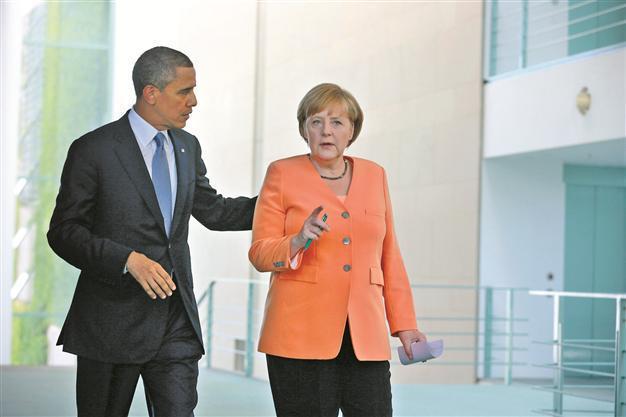Washington and Berlin in high-level spy talks
WASHINGTON / BERLIN

US President Barack Obama and German Chancellor Angela Merkel (R) make their way to a news conference at the Chancellery in Berlin. REUTERS photo
U.S. President Barack Obama sought to allay the concerns of German Chancellor Angela Merkel about reported U.S. spying on European allies on July 3, with the two agreeing to hold a high-level meeting on the subject in the coming days.Germany and other European nations are outraged over last month’s revelations by a U.S. contractor that the National Security Agency (NSA) has been scooping up vast amounts of data on Americans and foreigners. Seeking to limit the fallout from the scandal, Obama spoke with German Chancellor Angela Merkel on July 3 to address concerns. “The president assured Merkel that the U.S. takes seriously the concerns of our European allies,” according to a readout of the call between the two leaders. The White House said they agreed to a “high-level meeting” between U.S. and German officials in the coming days to address intelligence matters, and that a U.S.-EU dialogue on intelligence collection and data protection would begin as early as July 8. That appeared to be a concession of sorts to EU demands to set up working groups looking at the extent of the U.S. snooping into phone data, emails and web searches.
Merkel also welcomed an announcement by Obama that the U.S. would provide information to its allies on its surveillance activities. “The upcoming Washington visit by a delegation of representatives from German ministries and services will provide the opportunity for an intensive exchange on these issues, as well as for discussion on further deepened cooperation,” Merkel’s spokesman Steffen Seibert said.
The European Parliament meanwhile called for the scrapping of two agreements granting the U.S.
access to European financial and travel data unless Washington reveals the extent of its electronic spying operations in Europe. A non-binding resolution said the U.S. should come clean about its surveillance or risk seeing the transatlantic information-sharing deals, created in the wake of the Sept. 11 attacks, torn up.
Hero’s welcome to Morales
In a separate development, Bolivian President Evo Morales urged European countries to “free themselves from the U.S. empire” as he arrived home late July 3 after his plane was diverted because of suspicions Snowden was traveling with him. Morales received a hero’s welcome from dozens of cheering supporters when his aircraft touched down near La Paz almost 17 hours after leaving Vienna.
French agency spies too
PARIS – Reuters
It said the DGSE intercepted signals from computers and telephones in France, and between France and other countries, although not the content of phone calls, to create a map of “who is talking to whom.” It added the French national security commission whose job it is to authorize targeted spying, and the parliamentary intelligence committee said it worked in accordance with the law.
















